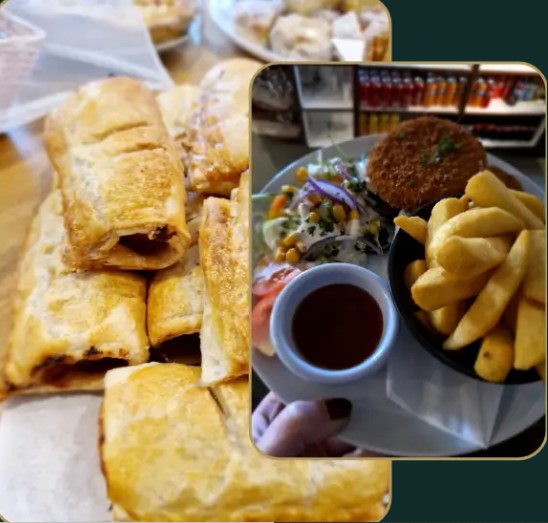The Evolution of Coffee Shop Culture
Quote from fikkaaa33 on October 25, 2025, 7:54 amCoffee shops today are vibrant, stylish, and central to social life—but they weren’t always this way. Their history stretches back centuries, evolving from simple meeting places into the cultural icons they are now. Understanding how coffee shop culture developed offers insight into why these spaces continue to hold such importance around the world.
Early Origins
The story of coffee shops begins in the Middle East. In the 16th century, cities like Istanbul, Cairo, and Mecca saw the rise of qahveh khaneh—public coffee houses where people gathered to drink, converse, and share ideas. These spaces quickly became cultural hubs, earning nicknames like “schools of the wise.” They were places for storytelling, music, and even political debate.
Arrival in Europe
By the 17th century, coffee houses spread across Europe. London’s first coffee house opened in 1652, and soon after, the city was filled with them. Known as “penny universities,” these cafés charged just a penny for admission and a cup of coffee, offering people a chance to engage in conversation and debate. Writers, philosophers, and merchants all used coffee houses as places to exchange ideas—shaping literature, politics, and commerce.
Coffee Shops and Creativity
Throughout history, cafés have been closely linked to creative movements. In Paris during the 19th and 20th centuries, coffee houses were haunts for artists, poets, and intellectuals. Famous figures like Picasso, Hemingway, and Sartre spent hours in cafés, using them as both studios and stages. The atmosphere of these spaces encouraged collaboration, reflection, and innovation.
Modern Coffee Culture
Fast forward to today, and coffee shops are still cultural touchpoints. The rise of specialty coffee in recent decades has transformed cafés into destinations for both connoisseurs and casual drinkers. Customers now expect not only a quality cup but also an experience—latte art, cozy interiors, and menus with international flair. The café has become a lifestyle space, where design and ambiance matter as much as the drinks.
Global Variations
What’s fascinating is how coffee culture adapts around the world. In Italy, cafés (or “bars”) are fast-paced, with locals drinking espresso while standing at the counter. In Sweden, the concept of “fika” emphasizes slowing down and sharing coffee with friends. In the United States, cafés often double as workspaces, equipped with Wi-Fi and comfortable seating. Each country adds its own twist, showing how adaptable and universal coffee culture has become.
Technology and Coffee Shops
The digital age has further reshaped coffee shop culture. Free Wi-Fi, mobile ordering, and digital loyalty programs make cafés more convenient than ever. At the same time, social media has turned coffee shops into aesthetic destinations. A beautifully designed café with photogenic lattes can become an instant online sensation, drawing customers eager to capture the experience for themselves.
Community and Identity
Despite these changes, one thing remains constant: coffee shops are about community. They’re spaces where people feel connected, whether through casual chats with baristas or by attending community events. Many cafés even position themselves as extensions of local culture, showcasing art from neighborhood creators or hosting charity drives.
The Future of Coffee Shops
Looking ahead, coffee shop culture will likely continue to evolve with changing lifestyles. Sustainability is becoming central, with cafés embracing eco-friendly practices like reusable cups, plant-based menus, and ethical sourcing. Hybrid spaces may also grow—cafés that double as bookstores, art galleries, or co-working hubs. The essence of coffee shops will stay the same, but the ways they serve communities will keep expanding.
Conclusion
From their beginnings in Middle Eastern cities to their role as modern cultural icons, coffee shops near me have always been more than places to drink coffee. They’ve been gathering spaces, creative hubs, and reflections of the societies around them. Their evolution shows just how enduring and adaptable café culture truly is. As long as people seek connection, inspiration, and comfort, coffee shops will remain part of daily life.
Coffee shops today are vibrant, stylish, and central to social life—but they weren’t always this way. Their history stretches back centuries, evolving from simple meeting places into the cultural icons they are now. Understanding how coffee shop culture developed offers insight into why these spaces continue to hold such importance around the world.
Early Origins
The story of coffee shops begins in the Middle East. In the 16th century, cities like Istanbul, Cairo, and Mecca saw the rise of qahveh khaneh—public coffee houses where people gathered to drink, converse, and share ideas. These spaces quickly became cultural hubs, earning nicknames like “schools of the wise.” They were places for storytelling, music, and even political debate.
Arrival in Europe
By the 17th century, coffee houses spread across Europe. London’s first coffee house opened in 1652, and soon after, the city was filled with them. Known as “penny universities,” these cafés charged just a penny for admission and a cup of coffee, offering people a chance to engage in conversation and debate. Writers, philosophers, and merchants all used coffee houses as places to exchange ideas—shaping literature, politics, and commerce.
Coffee Shops and Creativity
Throughout history, cafés have been closely linked to creative movements. In Paris during the 19th and 20th centuries, coffee houses were haunts for artists, poets, and intellectuals. Famous figures like Picasso, Hemingway, and Sartre spent hours in cafés, using them as both studios and stages. The atmosphere of these spaces encouraged collaboration, reflection, and innovation.
Modern Coffee Culture
Fast forward to today, and coffee shops are still cultural touchpoints. The rise of specialty coffee in recent decades has transformed cafés into destinations for both connoisseurs and casual drinkers. Customers now expect not only a quality cup but also an experience—latte art, cozy interiors, and menus with international flair. The café has become a lifestyle space, where design and ambiance matter as much as the drinks.
Global Variations
What’s fascinating is how coffee culture adapts around the world. In Italy, cafés (or “bars”) are fast-paced, with locals drinking espresso while standing at the counter. In Sweden, the concept of “fika” emphasizes slowing down and sharing coffee with friends. In the United States, cafés often double as workspaces, equipped with Wi-Fi and comfortable seating. Each country adds its own twist, showing how adaptable and universal coffee culture has become.
Technology and Coffee Shops
The digital age has further reshaped coffee shop culture. Free Wi-Fi, mobile ordering, and digital loyalty programs make cafés more convenient than ever. At the same time, social media has turned coffee shops into aesthetic destinations. A beautifully designed café with photogenic lattes can become an instant online sensation, drawing customers eager to capture the experience for themselves.
Community and Identity
Despite these changes, one thing remains constant: coffee shops are about community. They’re spaces where people feel connected, whether through casual chats with baristas or by attending community events. Many cafés even position themselves as extensions of local culture, showcasing art from neighborhood creators or hosting charity drives.
The Future of Coffee Shops
Looking ahead, coffee shop culture will likely continue to evolve with changing lifestyles. Sustainability is becoming central, with cafés embracing eco-friendly practices like reusable cups, plant-based menus, and ethical sourcing. Hybrid spaces may also grow—cafés that double as bookstores, art galleries, or co-working hubs. The essence of coffee shops will stay the same, but the ways they serve communities will keep expanding.
Conclusion
From their beginnings in Middle Eastern cities to their role as modern cultural icons, coffee shops near me have always been more than places to drink coffee. They’ve been gathering spaces, creative hubs, and reflections of the societies around them. Their evolution shows just how enduring and adaptable café culture truly is. As long as people seek connection, inspiration, and comfort, coffee shops will remain part of daily life.
Uploaded files:Quote from VPNEER on October 31, 2025, 5:20 amhttps://sngine.fr/blogs/12489/Urban-VPN-Review-What-s-the-Real-Cost-of-Free
https://wefreeads.com/best-vpn-for-streaming/
https://www.acoredu.com/forums/topic/the-simple-analysis-of-mullvad-vpn-price/
https://www.backofhouse.art/forum/topic/why-mull-vad-vpn-continues-to-shine-through/#postid-114
https://www.biosledbackpack.com/forums/topic/privacy-first-extras-later-mullvad-review/
https://schoolcollective.net/forums/topic/what-is-vpn-on-iphone-a-basic-protection-in-everyday-life/
https://seha2all.com/events/topic/view/event_id/5/topic_id/3258/post_id/4048
https://serabyte.de/index.php?topic=1500.new#new
https://seohelpforum.com/forums/topic/learning-about-vpn-free-trial-smart-start-of-online-privacy/
https://strugglingwithdiabetes.com/Community/index.php?topic=33306.new#new
https://takebackbaltimore.net/smf/index.php?topic=447027.new#new
https://talkglobalpolitics.com/viewtopic.php?t=300886
https://hikeharmony.org/index.php?topic=732.new#new
https://hellovivat.com/forums/topic/use-the-right-vpn-to-take-control-of-tiktok-enterprises/
https://forumuniversal.com/index.php?topic=11826.new#new
https://jaskys.com/events/topic/view/event_id/5/topic_id/83/post_id/97
https://kampingsucks.com/forum/topic/the-true-value-of-surfshark-vpns-cost/#postid-169
https://the-lan.co.uk/forum/viewtopic.php?t=778
https://kcva.co.za/forums/topic/is-mullvad-vpn-actually-free-dispelling-the-myths/
https://www.thevincy.com/forums/topic/view/261?page=1
https://italiankitchenclub.com/en/forum/topic/use-quick-vpn-to-speed-up-your-online-experience/
https://thepuk.com/boards/topic/14449/the-reason-the-cheapest-vpn-is-not-the-most-prudent-choice
https://way2society.com/forum/viewtopic.php?f=1&t=222
https://www.blkfuse.com/groups/topic/view/group_id/101/topic_id/147/post_id/162
https://www.golfwmga.com/forums/topic/free-roblox-vpn-game-on-with-zero-cost/
https://www.realestatetalk.in/index.php?topic=447.new#new
https://www.ww2.site/forum/viewtopic.php?t=54
https://phoenixwow.org/forums/index.php?topic=321.new#new
https://radfriends.imemed.co.za/viewtopic.php?f=4&t=41318&p=232615#p232615
https://reviewit.ng/post-a-review/topic/game-vpn-the-secret-of-competitive-gamers/#postid-1187
https://setup-stuff.com/index.php/topic,183.new.html#new
https://thebluescrubs.com/forums/topic/vpns-in-gaming-the-sauce-of-multiplayer-rustle/
https://inklume.xyz/top-speed-vpns-of-2025-a-practical-guide-to-the-fastest-services/
https://www.youthfulyarn.com/top-vpns-for-a-safe-and-fun-filled-gaming-experience/
https://sngine.fr/blogs/12489/Urban-VPN-Review-What-s-the-Real-Cost-of-Free
https://www.fall-in-veteran.com/blogs/28108/Surfshark-VPN-Review-Unlimited-Devices-Budget-Friendly-Security
https://wefreeads.com/best-vpn-for-streaming/
https://www.acoredu.com/forums/topic/the-simple-analysis-of-mullvad-vpn-price/
https://www.backofhouse.art/forum/topic/why-mull-vad-vpn-continues-to-shine-through/#postid-114
https://www.bethesdaipswich.com/forum/topic/understanding-mullvad-pricing-flat-fair-fixed/#postid-271
https://www.biosledbackpack.com/forums/topic/privacy-first-extras-later-mullvad-review/
https://www.bitmain.si/forum/index.php?page=topicview&id=all-about-litecoins%2Fopenvpn-with-mullvad&post_id=823&redirected=1#post_823
https://www.conservativedating.com/groups/black-ops-6-bot-lobbies-u4gm/forum/topic/why-vpn-on-your-iphone-matters-more-than-you-think/#post-2674
https://schoolcollective.net/forums/topic/what-is-vpn-on-iphone-a-basic-protection-in-everyday-life/
https://sdghubnamibia.nsa.org.na/topic/what-is-using-vpn-on-an-iphone-the-secret-gardian-in-your-settings/
https://seha2all.com/events/topic/view/event_id/5/topic_id/3258/post_id/4048
https://sembilanwali.com/forums/topic/what-is-vpn-on-iphone-and-how-it-impacted-your-internet-security/
https://serabyte.de/index.php?topic=1500.new#new
https://seohelpforum.com/forums/topic/learning-about-vpn-free-trial-smart-start-of-online-privacy/
https://strugglingwithdiabetes.com/Community/index.php?topic=33306.new#new
https://takebackbaltimore.net/smf/index.php?topic=447027.new#new
https://talkglobalpolitics.com/viewtopic.php?t=300886
https://hikeharmony.org/index.php?topic=732.new#new
https://hellovivat.com/forums/topic/use-the-right-vpn-to-take-control-of-tiktok-enterprises/
https://forumuniversal.com/index.php?topic=11826.new#new
https://jaskys.com/events/topic/view/event_id/5/topic_id/83/post_id/97
https://kampingsucks.com/forum/topic/the-true-value-of-surfshark-vpns-cost/#postid-169
https://the-lan.co.uk/forum/viewtopic.php?t=778
https://kcva.co.za/forums/topic/is-mullvad-vpn-actually-free-dispelling-the-myths/
https://lawnplus.me/forums/topic/369/using-the-proper-vpn-to-unlock-chromebook-potential/view/post_id/376
https://www.thevincy.com/forums/topic/view/261?page=1
https://www.thewayofstandrews.com/forum/topic/nordvpn-streaming-what-makes-it-a-better-vpn-in-the-ocean-of-vpns/#postid-257332
https://italiankitchenclub.com/en/forum/topic/use-quick-vpn-to-speed-up-your-online-experience/
https://hoomet.com/forums/topic/3866/the-best-netflix-vpn-to-use-to-open-international-content/view/post_id/120382
https://thepuk.com/boards/topic/14449/the-reason-the-cheapest-vpn-is-not-the-most-prudent-choice
https://way2society.com/forum/viewtopic.php?f=1&t=222
https://www.blkfuse.com/groups/topic/view/group_id/101/topic_id/147/post_id/162
https://www.golfwmga.com/forums/topic/free-roblox-vpn-game-on-with-zero-cost/
https://www.realestatetalk.in/index.php?topic=447.new#new
https://www.ww2.site/forum/viewtopic.php?t=54
https://phoenixwow.org/forums/index.php?topic=321.new#new
https://radfriends.imemed.co.za/viewtopic.php?f=4&t=41318&p=232615#p232615
https://reviewit.ng/post-a-review/topic/game-vpn-the-secret-of-competitive-gamers/#postid-1187
https://setup-stuff.com/index.php/topic,183.new.html#new
https://thebluescrubs.com/forums/topic/vpns-in-gaming-the-sauce-of-multiplayer-rustle/
https://schoolcollective.net/forums/topic/vpn-gaming-rebuild-the-networking-of-connection-and-competition/
https://inklume.xyz/top-speed-vpns-of-2025-a-practical-guide-to-the-fastest-services/
https://www.youthfulyarn.com/top-vpns-for-a-safe-and-fun-filled-gaming-experience/


